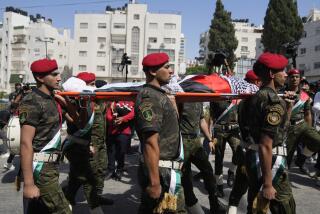O.C. Activist’s Slaying Galvanizes S. Africans : Reaction: Many in divided nation are publicly mourning Amy Biehl, making pleas for end of bloodshed.
- Share via
CAPE TOWN, South Africa — The stabbing death this week of a popular, 26-year-old Fulbright scholar by a band of angry black youths has served to unify disparate groups of blacks and whites in a powerful way, prompting new calls for an end to street violence.
Acting President Pik Botha asked South African leaders Friday to join him in seeking peace, while leaders of the African National Congress offered their help to police in tracking down the killers of Amy Elizabeth Biehl of Newport Beach. Two teen-agers have been held in the slaying, but more arrests are expected.
At the same time, 40 members of the black Guguletu township where Biehl was killed visited the U.S. Consulate in Cape Town to express condolences. Throughout the day Friday, South Africans jammed phone lines and appeared in person at the consulate to register their outrage over Biehl’s slaying.
“I have been through this sort of thing before, but I have never seen anything like this response,” said Kyra Eberle, a spokeswoman from the U.S. Consul-General’s office in Cape Town. “To sum it up, the message was: We must have peace and we must have it now.”
Biehl, in an orange Mazda with a bumper sticker that read “Our Land Needs Peace,” was driving three black friends home when a mob of about 100 ambushed the car and pulled her into the street. While pleading for her life, Biehl was hit in the head with a brick and stabbed.
Students at the University of the Western Cape, which Biehl had been attending for the past 10 months as a Fulbright scholar, protested her death en masse Thursday after an emotional campus memorial service that drew about 1,000 people. A church service is planned Sunday morning in the Guguletu township.
At the home of Biehl’s parents in Newport Beach on Friday, family members continued to speak out about their loss, using the opportunity to focus attention on the plight of South Africa.
Biehl often “helped people by making them greater, larger, than what they really are,” her father, Peter Biehl, said. “I’d like to think that her death has made (the country) pause to think that the time has come for (it) to take action. Amy represented and stood for ideas whose time have come. It’s now the right time for South Africa to unite.”
Biehl will be cremated in Cape Town and her ashes will be flown back to the United States for a memorial service at 3 p.m. Friday at St. Andrews Presbyterian Church of Newport Beach.
Services are also being planned at First African Methodist Church in Los Angeles, but a date has not been set.
Violence continued to escalate in South Africa Friday, two days after Biehl’s death. Eight people--six white and two black--were wounded during an automatic rifle attack on a double-decker bus traveling from Cape Town to Johannesburg. Five were hospitalized and three others were released after being treated at the scene of the shooting, about 280 miles northeast of Cape Town.
Foreign Minister Botha, acting president while F.W. de Klerk is visiting South America, called on the major political parties of the country to “put aside their differences and come together in a joint strategy to end this evil.”
South Africa, Botha said, is increasingly becoming viewed by the rest of the world as “a country of violence where human life is not respected.”
A study presented this week in Johannesburg concluded that South Africa has 53.5 murders a year for every 100,000 people, making it the most violent country in the world. In the United States, 17.2 per 100,000 are murdered.
Counsel General Frik Schoombee of the South African Consulate in Beverly Hills said Friday that Americans may be reluctant to visit his country now, but emphasized that there are danger spots throughout the world that must be avoided, including travel by whites in black townships there.
About 10,000 Americans live in South Africa, and as democratic elections draw near, more and more are visiting to help participate in voter education programs or just to be close at hand as apartheid is dismantled.
This past week, Schoombee said, visa restrictions had been eased, allowing freer travel to South Africa.
“The sad irony of the case of Amy Biehl is that her death comes during the dawn of a new day in South Africa,” Schoombee said. “It is not surprising because there are fringe elements that do not want to see democracy succeed. Amy Biehl lost her life bringing people together.”
Larry Diamond, senior research fellow at Stanford University’s Hoover Institute, said that Biehl’s death, “coupled with the massacre of close to a dozen whites in a church in Cape Town recently, are really beginning to catalyze the country into action. I think South Africa has reached a point where ordinary citizens are fed up, and they feel they will have to do something soon.”
In a way similar to how the killing of 28 African National Congress troops by South African Army troops last year spurred the government to begin negotiating its first multiracial elections, Biehl’s murder ultimately may have a positive impact on the country’s future, Schoombee said.
“You always learn a lesson from these tragedies, and the one thing that we’ve taken as positive is that peace will never come from the barrel of the gun,” he said.
Andy Reynolds, a 26-year-old doctoral student at UC San Diego who just returned from political work in Cape Town last week, agreed that the publicity over the killing will help bring people together in South Africa during its critical move toward democratization.
“This will actually coalesce the more moderate and more decent-minded groups around the political spectrum to bring in more political help,” said Reynolds, a former UC Irvine research fellow who worked for a year at the University of Cape Town in electoral reform and wrote a book on the subject that is now in print in South Africa.
Reynolds said he saw a marked increase in random violence in South Africa--both political and apolitical--since he first visited in 1991.
“As shocking as (the killing) is, it’s not really a surprise,” said Reynolds, a native of London. “Life has just become so undervalued . . . especially in the townships. They’re desensitized to death and violence there, and you get conditioned to it.”
But Biehl’s death seems to loom much larger than the random violence that occurs daily.
“I get the impression this won’t be forgotten,” he said. “Her legacy will be that we move forward to an election and to the democratic change that she was working for.”
Times staff writer Lily Dizon in Orange County and the Associated Press contributed to this report. Platte reported from Orange County and Heard reported from South Africa.
* AMY BIEHL’S LEGACY: Family, professor considering endowment, scholarship. A12
More to Read
Sign up for Essential California
The most important California stories and recommendations in your inbox every morning.
You may occasionally receive promotional content from the Los Angeles Times.













